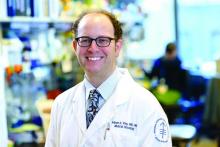I just hung up with a friend I haven’t seen in decades. Her father has advanced cancer, and while she does not have formal medical training, a passerby wouldn’t know it. Her questions are spot on, her resources are peer reviewed and validated, and her questions I’d more likely expect from trainees in a formal oncology training program than from the director of an elementary level tutoring service.
Her father is fortunately doing well, but she’s searching for the next plan for when the standard drugs ultimately fail. We know they will fail. She’s connected to patient advocacy groups, emailing physicians across the country, and looking into clinical trials with their exhaustive lists of exclusion criteria. She sees the logistic difficulties with trials far from home. She’s hit the key issues we face every day in clinical research, and she’s never stepped foot in a medical school lecture hall.
Amazingly her story is not unique. When cancer hits close to home is when these problems become very clear. This same story could easily have been retold as the narrative of former Vice President Joe Biden and his care for his son. Both my friend and Mr. Biden, in fact, asked me the same question: How do we get the cutting-edge science from major research centers out to the rest of the country?
The Cancer Moonshot initiative has done much to promote collaboration, but one major success has been in the Count Me In initiative, a partnership between the Biden Cancer Initiative, Emerson Collective, the Broad Institute, and the Dana-Farber Cancer Institute. Their goal is to gain access to thousands of patients, collect data on treatment and outcomes, and collect biological specimens. They are not alone, the MSK-IMPACT initiative – led by David B. Solit, MD, at my institution – aims to sequence rare cancers. Both programs have heavily leveraged social media to access and engage patients.
There are of course concerns. Coming from hundreds or thousands of different sites will mean the data will likely be heterogeneous in formatting and quality. How do we ensure the security of patient data? Can we rely on patients and family members to report accurately and without bias? We know there are challenges and upside to crowdsourced patient recruitment.
David Ginsburg, MD, Karl Desch, MD, and colleagues enrolled more than 1,000 students from the University of Michigan to participate in a study on blood clotting factors. This led to many important findings on the genetic basis for coagulopathies, but also was instructive in uncovering a worrisome aspect of online patient registration. The group recorded the time taken for registrants to read the consent form – including whether the participant clicked a hyperlink that was embedded. Nearly a quarter of participants accepted the terms of the 2,833-word document in less than 10 seconds, and less than 3% clicked the hyperlink (Ann Intern Med. 2011 Sep 6;155[5]:316-22).
Are these patients, who we are asking for their partnership and trust, really understanding to what they are agreeing?
Surely there is tremendous altruism on the part of these patients. Their hopes of helping the future of cancer care does have a real track record. Crowdsourcing efforts that were less far reaching in scope made substantial impact in discovering the genetic basis for polycythemia vera. The patients, contacted largely through printed newspaper ads, have helped millions of others. What will happen when we add in the power of social media will be exciting to see – and there is something else that comes with great power, but since I can’t seem to remember what that is, I’ll just search online.
Dr. Viny is with the Memorial Sloan-Kettering Cancer Center, N.Y., where he is an assistant attending physician on the leukemia service and is a clinical researcher in the Ross Levine Lab. Follow him on Twitter @TheDoctorIsVin.

